● AI PC stocks offer promising returns as the integration of AI in computing drives strong demand across consumer and enterprise markets.
● The rapid adoption of AI-powered PCs presents substantial growth opportunities, with market projections estimating AI PCs will comprise 43% of all PCs by 2025.
● However, AI PC stocks may experience volatility due to technological advancements, evolving competition, and regulatory challenges in the global market.
I. What is an AI PC
An AI PC, defined by industry leaders Microsoft and Intel, is a next-generation personal computer equipped with specialized hardware and software that enable high-efficiency, real-time artificial intelligence (AI) processing. The core distinction lies in its integration of an AI-focused Neural Processing Unit (NPU) alongside traditional CPU and GPU architectures. Unlike standard CPUs that handle general-purpose computing and GPUs that accelerate graphics, NPUs are dedicated to efficiently running AI and machine learning tasks like image recognition, natural language processing, and complex data analysis. Microsoft’s "Copilot" feature exemplifies how AI can be integrated into everyday software, leveraging real-time AI processing to enhance user productivity by enabling contextual assistance and predictive text generation within the operating system.
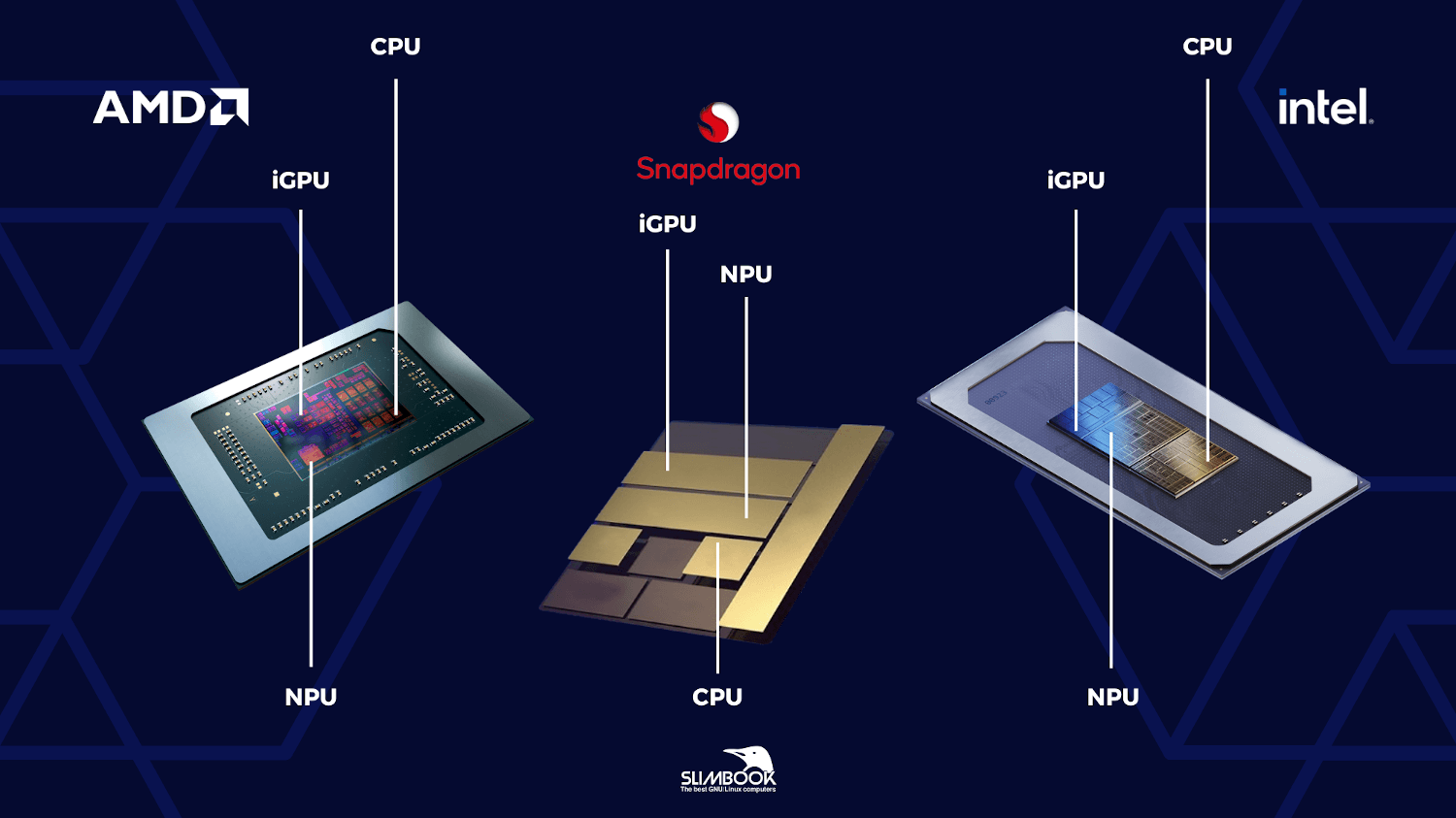
Source: slimbook.com
Why Invest in AI PC Stocks?
AI PCs are positioned for significant growth, driven by rapid adoption across industries and consumers seeking enhanced performance capabilities. With the global AI hardware market projected to grow rapidly, may hit $990 billion by 2027, AI-capable PCs are expected to see a commensurate rise, providing investors with substantial growth potential. Unlike traditional PCs, AI PCs serve diverse applications beyond typical consumer use, including gaming, data analysis, healthcare diagnostics, cybersecurity, and other compute-heavy applications that require efficient AI processing. For example, AI PCs can optimize gameplay in real-time, enhance threat detection in cybersecurity, and process complex datasets in research, differentiating themselves in both value and utility.
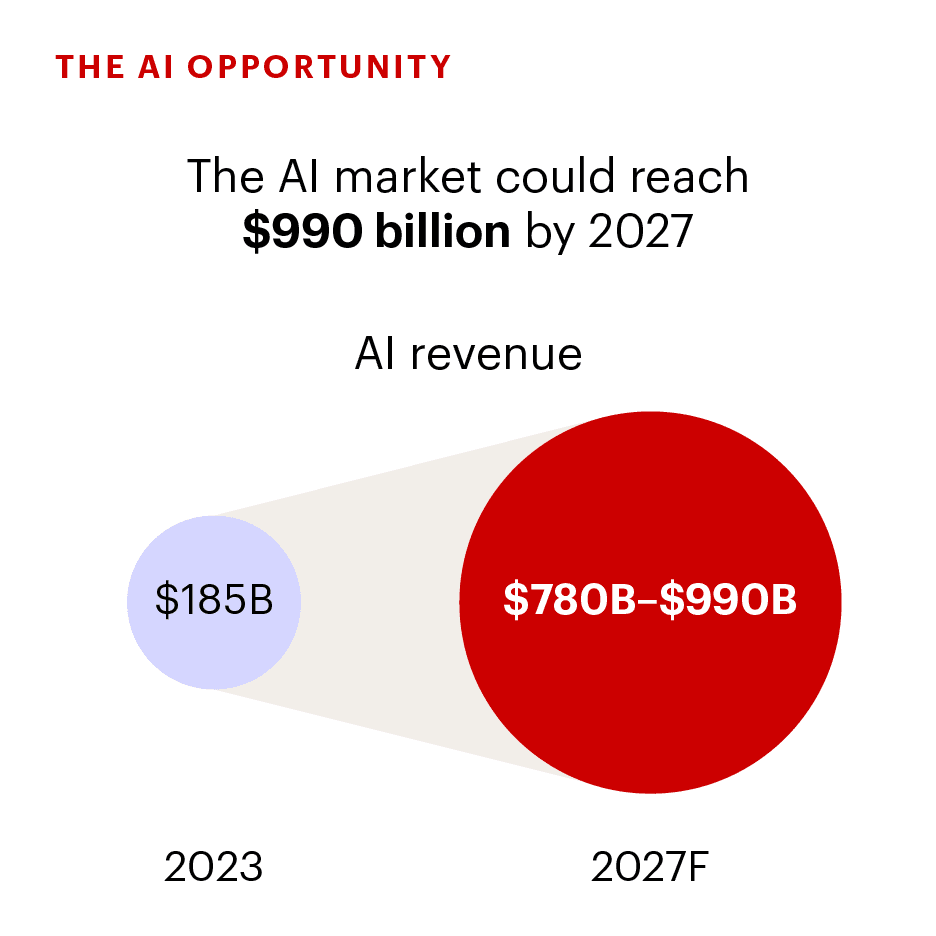
Source: bain.com
From an investment perspective, AI PC stocks represent an emerging market segment distinct from traditional PC stocks, with increased potential for high returns. Innovation within the sector—such as Intel's AI-optimized processors and Microsoft's continued integration of AI into operating systems—further positions AI PCs as a superior alternative to conventional PCs, which lack the specialized hardware needed to support sophisticated AI functionalities. This evolution could result in exponential growth, setting AI PCs apart as a lucrative investment category.
II. Best AI PC Stocks
Microsoft (MSFT)
Microsoft is at the forefront of AI in personal computing, notably with its AI-driven "Copilot+" PCs, which leverage AI capabilities in Windows OS. Key AI functionalities, such as “Click to Do” overlays, integrate smoothly into its systems. MSFT holds a significant advantage due to its deep integration of AI in the Windows OS and its extensive ecosystem, which includes partnerships with AMD, Intel, and Qualcomm for Copilot+ PCs. Microsoft’s revenue rose to $65.59 billion in Q1 fiscal 2025, up 16.04% year-over-year. The company’s approach, combining AI with productivity tools, offers a strong long-term outlook as Windows transitions from Windows 10 to AI-enhanced Windows 11.
Intel (INTC)
Intel recently launched the “Core Ultra 200V series,” optimized for mobile AI and energy efficiency. It leads the AI PC category with innovations like “Lunar Lake” processors, which cater to high-performance needs. Intel’s market penetration is vast, with plans to ship over 100 million AI PCs by 2025. Its robust support for the AI PC ecosystem further strengthens its position. Despite a recent dip in quarterly revenue to $13.28 billion (-6.17% YoY), Intel’s commitment to the AI PC sector, combined with upcoming processor releases like “Panther Lake,” positions it for recovery and growth.
Dell Technologies (DELL)
Dell offers customizable AI-powered systems for corporate clients. As Windows 10 nears its end-of-life, Dell’s flexible solutions are poised to capture a growing AI PC market. With a strong footprint in AI and an anticipated PC refresh cycle, Dell is positioned to address diverse AI computing needs. Dell’s quarterly revenue grew to $25.03 billion (up 9.12% YoY), reflecting robust demand. Its adaptability and early adoption of AI technologies align well with the sector’s trajectory.
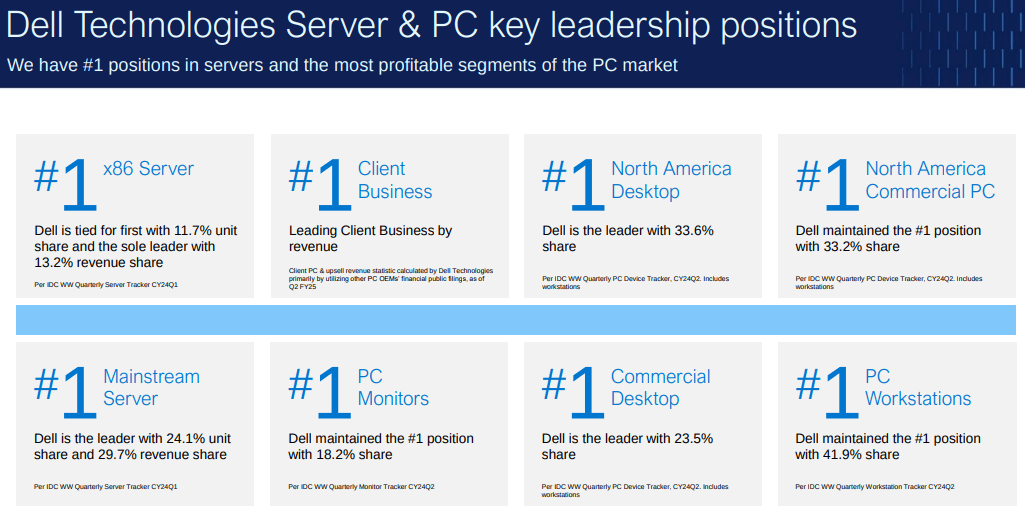
Source: Dell Investor Presentation
HP Inc. (HPQ)
HP’s latest AI PCs use Qualcomm and AMD processors, focusing on mobility and long battery life. The OmniBook Ultra, with HP Wolf Security, caters to security-conscious AI users. HP’s products are highly regarded, with increased adoption among both consumers and businesses. HP’s revenue grew to $13.52 billion (up 2.45% YoY), with growing demand for high-ASP AI products. Its recent innovations in security and performance make it a top contender in AI PCs.
Lenovo (LNVGY)
Lenovo’s five-feature AI PC, launched in China, incorporates proprietary tech that enhances user experience across devices. As the market share leader in traditional PCs, Lenovo expects AI PCs to represent over 50% of its portfolio by 2027. Lenovo’s revenue reached $15.45 billion in Q1 fiscal 2025, up 20% YoY. Its strong growth strategy in AI and premium PC markets is likely to yield sustained returns.
NVIDIA (NVDA)
NVIDIA’s AI PCs include RTX-equipped systems, offering up to 1,300 AI TOPS. NVIDIA ACE, a suite of generative AI, enables real-time interactions in games. As a leader in AI chips, NVIDIA powers numerous AI applications and gaming systems. NVDA’s revenue surged to $30.04 billion (up 122.4% YoY). Its dominant position in AI hardware and consistent demand in gaming solidifies its role in AI PCs.
AMD (AMD)
AMD’s AI PCs are powered by its Ryzen AI processors, including the high-performance Ryzen 9000 series. The company has a solid market presence in consumer PCs and is expanding into AI, where it expects consistent growth. AMD posted $6.82 billion in revenue (up 17.57% YoY). Its robust consumer-driven focus, paired with AI developments, promises strong growth prospects.
Qualcomm (QCOM)
Qualcomm’s AI processors power mobile-first AI PCs, targeting a diverse range of price points. With expectations for AI PCs to represent 50% of the PC market by 2027, Qualcomm is expanding into AI at scale. QCOM achieved $9.39 billion in revenue (up 11.24% YoY). Qualcomm’s mobile-based AI strength and its partnerships within the AI PC market are key growth drivers.
Apple (AAPL)
Apple’s M4 chips power AI functionalities across Macs, offering high performance and customer satisfaction. Its premium brand reputation bolsters its position as a trusted AI PC provider. Apple’s revenue hit $94.93 billion (up 6.07% YoY). Its AI capabilities, combined with customer loyalty, enhance its growth potential in AI PCs.
Alphabet (GOOG)
Google’s Android-powered devices incorporate AI functionalities, including features like Gemini Live, which enhances interactivity. The company’s deep AI knowledge and consumer reach position it uniquely within the AI PC space. Google’s quarterly revenue was $88.27 billion (up 15.09% YoY). Its commitment to embedding AI across devices provides a competitive edge in AI PCs.
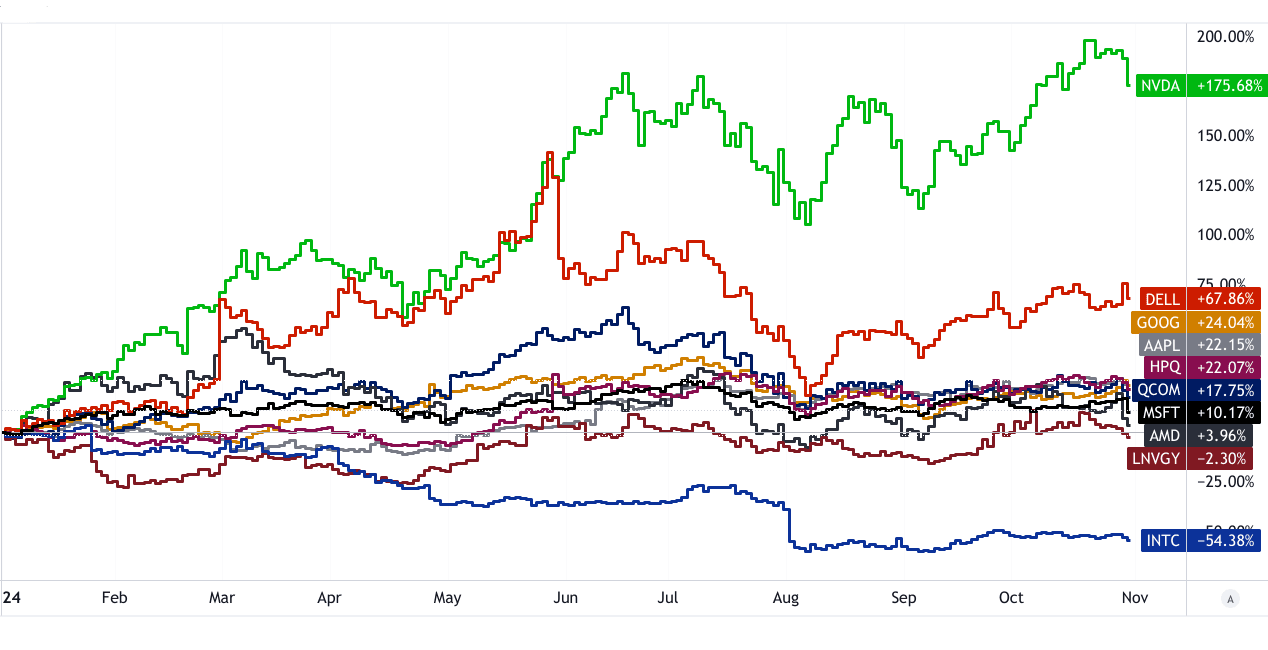
Source: tradingview.com
AI PC Stocks (Taiwan Stocks)
ASUSTeK Computer (2357)
A strong player in premium AI PCs, ASUS posted revenue growth of 27% YoY. ASUS’s 2024 YTD return is 25%, reflecting its commitment to AI-driven growth.
Acer Inc. (2353)
Acer is focusing on budget-friendly AI PCs. Revenue grew 7.6% YoY, though the stock is down 21% YTD, which could signal a potential turnaround opportunity.
Micro-Star International (2377)
MSI leverages AI technology for gaming PCs. MSI posted revenue growth of 13% YoY, although YTD return is -6%, signaling moderate growth potential in a competitive market.
Giga-Byte Technology (2376)
Giga-Byte leads with significant innovation in high-performance AI PCs. Giga-Byte’s revenue surged 182.89% YoY, with a YTD return of 13%, underscoring high growth and investment potential.
These companies reflect a spectrum of investments in AI PCs, offering varied returns and market positions that cater to both growth-oriented and value-focused investors.
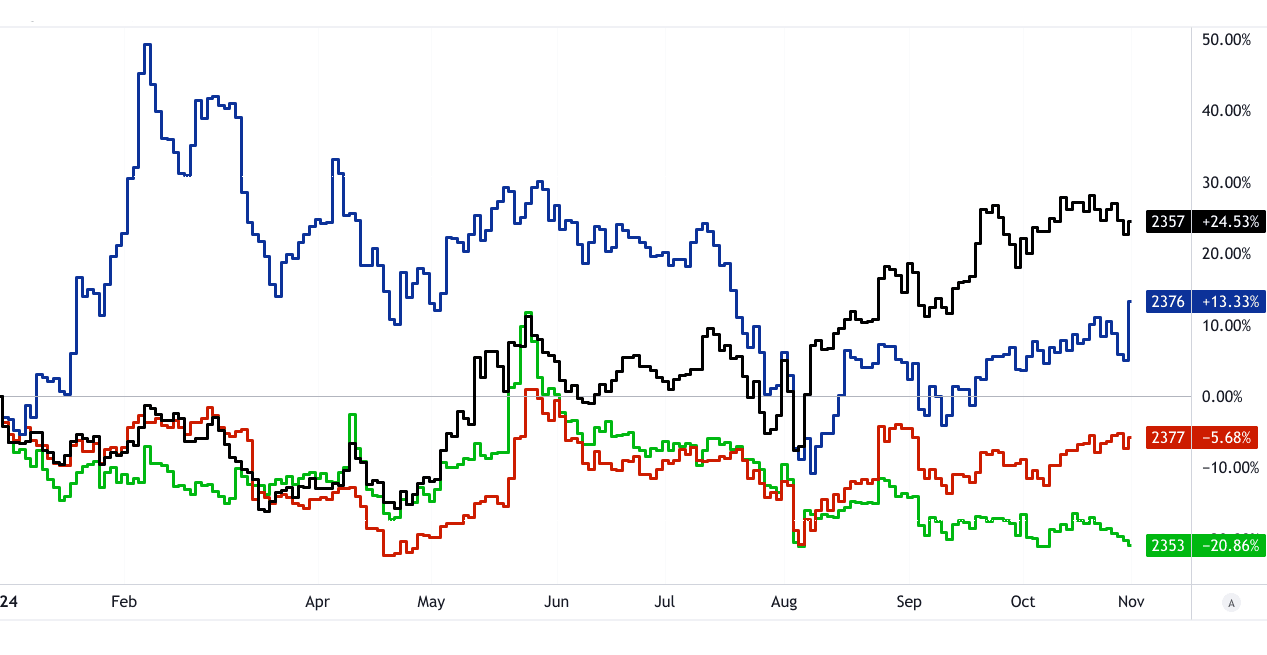
Source: tradingview.com
III. Factors to Consider When Investing in AI PC Stocks
Market Trends and Demand
AI integration is rapidly accelerating, with enterprise demand driving major growth. Canalys forecasts AI enabled PCs to be shipped by 2028 may hit +200 million units with an annual growth rate of 44% (CAGR) . Adoption rates for AI PCs are expected to rise sharply, with Intel, Lenovo, and HP estimating over 50% of PCs will feature AI capabilities by 2027, largely driven by businesses seeking enhanced productivity through AI-enabled functionalities.
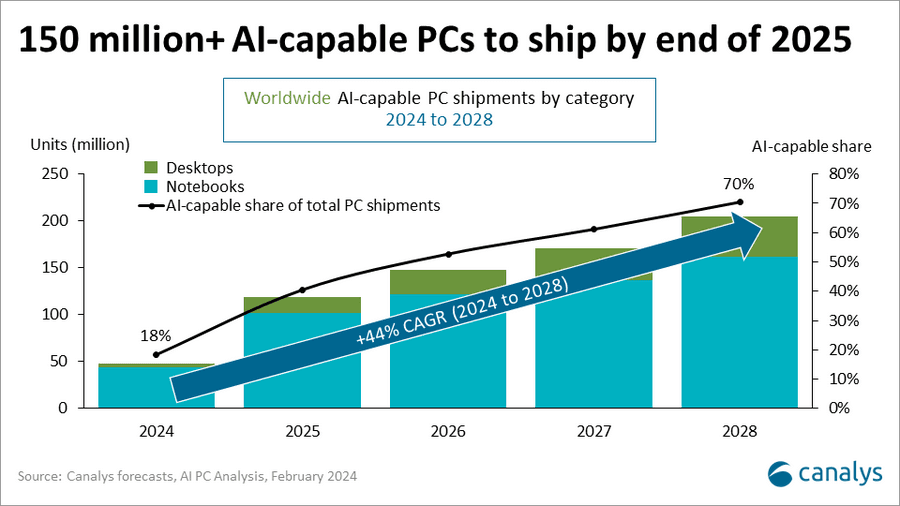
Source: canalys.com
Company Financial Health and Market Positioning
Examining revenue growth, profit margins, and debt levels provides insight into a company's resilience. For example, Nvidia and AMD, due to substantial R&D investments, saw revenue surges. Companies with strong balance sheets can outlast market downturns and continue AI-related innovations. Leading companies, like Microsoft and Nvidia, hold sizable market shares, benefiting from brand strength and established customer bases.
Technology and Product Portfolio
Firms with a diverse product lineup, such as Qualcomm’s Copilot-ready AI PCs and AMD’s Ryzen AI processors, offer a competitive edge. Intel’s Core Ultra and Apple’s M4 chips, designed for advanced AI applications, highlight innovation in processing power. A robust portfolio that serves both consumer and business markets enhances growth potential.
Risk Factors
Technological obsolescence remains a concern as AI continues to evolve, and outdated tech can quickly lose market relevance. Additionally, market volatility and regulatory shifts, such as potential restrictions on AI data handling, could impact profits. Companies navigating compliance hurdles and managing rapid tech advancements may have a strategic advantage in the evolving AI PC market.
IV. AI PC Industry Trends and AI PC Stocks Outlook
The AI PC market is set to grow significantly as hardware integration with AI accelerates across various sectors. In 2024, global PC shipments are projected to reach 265.4 million units, marking a 2% year-over-year increase, with forecasts by IDC suggesting a continued growth trajectory to 292.2 million units by 2028, driven by AI PC advancements. The AI PC segment, including desktops and laptops equipped with neural processing units (NPUs), is expected to reach 43 million units by the end of 2024—a nearly 100% increase from 2023. By 2025, AI PCs will account for 43% of total PC shipments, driven by increased adoption in enterprise and consumer markets.
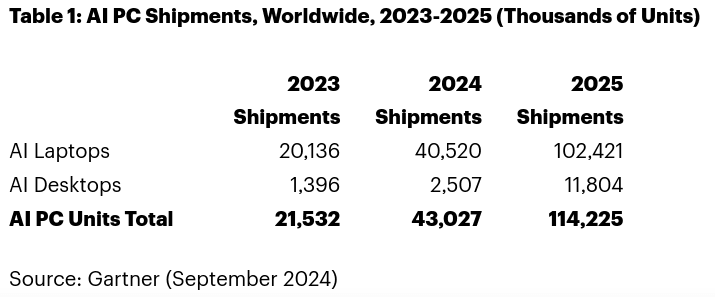
Source: gartner.com
Regional Market Analysis
The United States, China, and Europe are expected to be major adopters of AI PCs. North America is likely to experience high growth due to strong business demand for AI integration in data-intensive industries. Meanwhile, Asian markets like China and Japan show potential, particularly in the consumer gaming sector, as local companies increase investment in AI PC hardware.
Future Trends
In the next five years, we can expect further integration of AI into PC hardware, especially as the gaming industry embraces more AI-based applications and enhancements. As AI applications become standard in commercial PCs, sectors such as education, healthcare, and finance will drive adoption, spurred by demand for advanced data analysis and productivity features. Additionally, the consumer market is projected to expand, especially with security and privacy features becoming essential in AI PCs.
Long-Term Outlook for AI PC Stocks
Key players in the AI PC market—including Nvidia, Microsoft, Intel, and AMD—are positioned for sustained growth. Nvidia's AI-driven GPUs and processors offer powerful tools for data-intensive applications, while Microsoft and Intel's collaborations on Copilot-ready AI PCs are expected to attract enterprise buyers. Companies with robust R&D and innovation portfolios, such as Apple and AMD, are likely to benefit from increasing consumer and commercial demand. Gartner predicts that by 2026, AI laptops will dominate large business markets, with companies prioritizing AI PCs for their enhanced security, operational efficiency, and user experience.
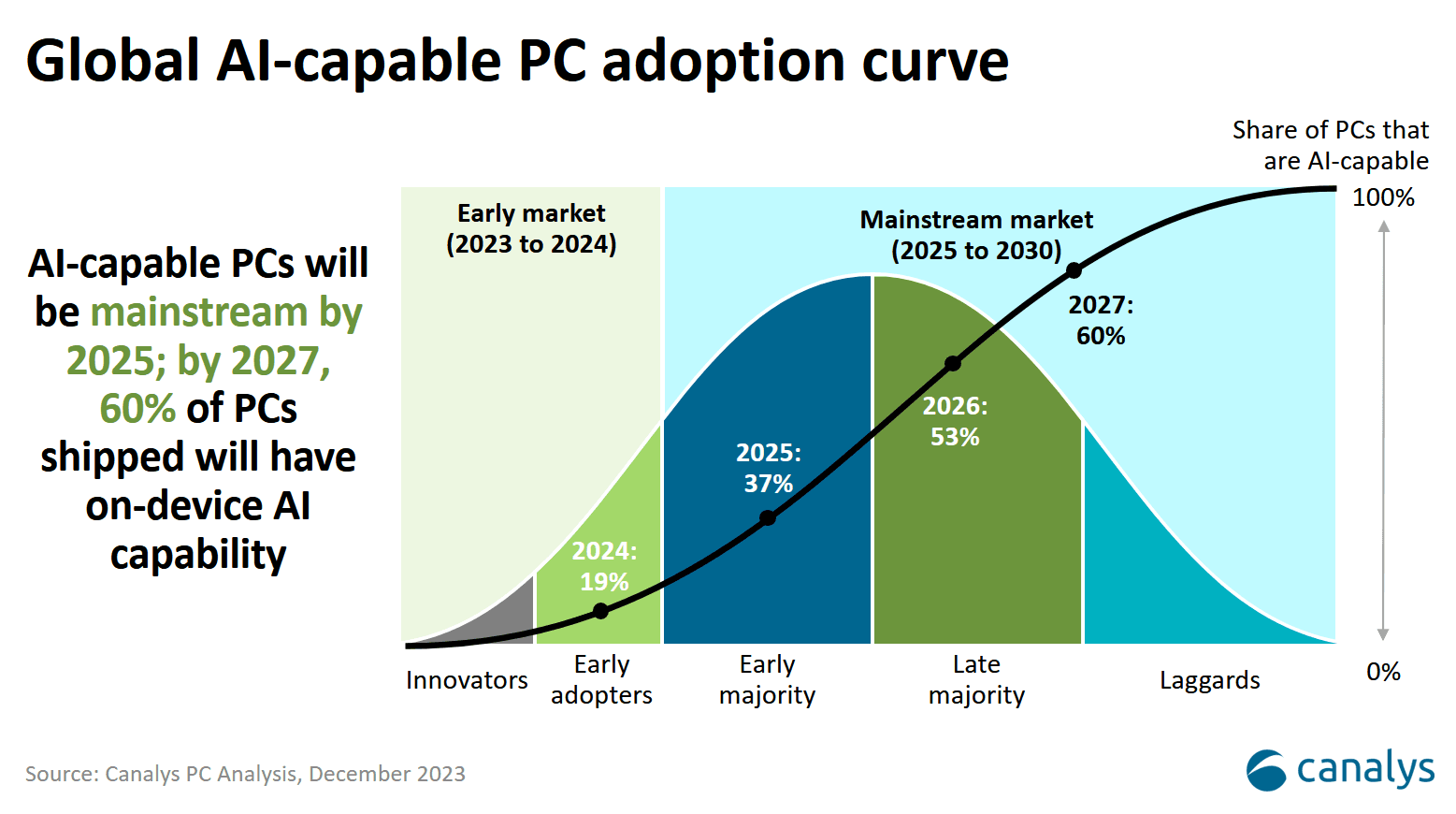
Source: canalys.com
*Disclaimer: The content of this article is for learning purposes only and does not represent the official position of SnowBallHare, nor can it be used as investment advice.
